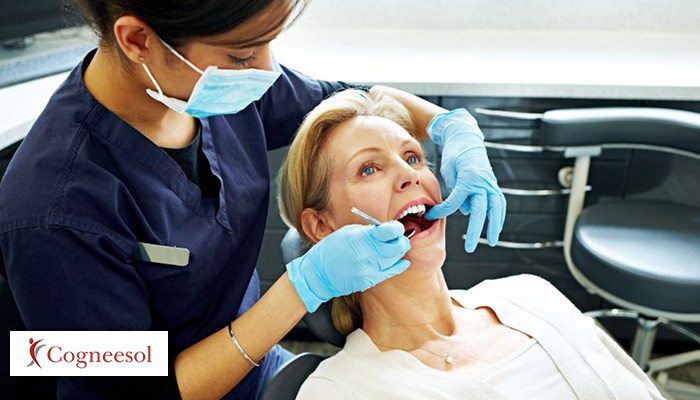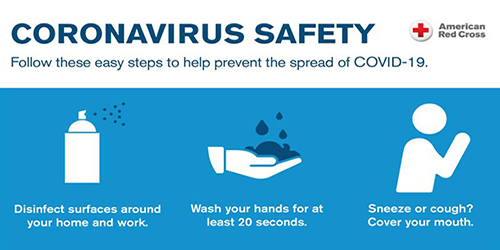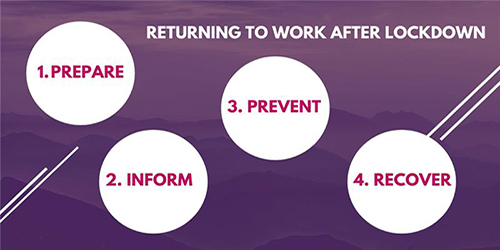
1000+
customers

50+ countries
across the world

Outsourcing leader
since 2008

Technology-driven
services

Stringent
quality processes
How can Dentists Cope with COVID-19 During and Post-Pandemic Period?
Last updated: 07 Feb, 2024 By Harinder Pal Singh | 6 Minutes Read

Covid-19 has impacted every business practice across the world, and the dental practice is no exception. What makes the dental practice more vulnerable to coronavirus. It is close patient contact, handling of sharp medical instruments, and high exposure against bodily fluids. All this makes the job of a dentist even more challenging. Since no vaccine is available for treating coronavirus, we cannot say how long this pandemic will last.
The Direct Impact of COVID-19
Ever since the lockdown came into existence during March, health authorities and regulators asked dentists to close down their operations immediately. They are only available for any emergency treatment. Similar to various businesses, the Dental Accountant too witnessed revenue losses and decreased cash flow.
However, in the case of dental services, it is not just the revenue that got affected but health too. You might not order food from outside, hire a cab from Uber but when you do not go out to treat tooth decay, it gets worse with the time that eventually gets treated with more severity and high treatment costs.
So, unlike other businesses, it is not just the dental firms that suffer losses, but people too are at its receiving end. However, with relaxation in lockdown, dental services are resuming, but dentists need to take extra preventive measures to ensure their safety against contracting coronavirus during and after the COVID-19 lockdown phase.
Ensuring Safety during Partial COVID-19 Lockdown
1.Restrict Clinic Entry
The first and foremost safety preventive measure for dentists is nothing but restricting the number of people coming inside their clinic. It is imperative that only patients are allowed inside the clinic and not their friends and relatives. This will help in restricting the infected individuals from entering the clinic.
2.Evaluate Every Patient
It is a must for dentists to evaluate every single patient during the pandemic period to establish signs of coronavirus. For this, measuring the body temperature of the patient and conducting a question-based screening that is focused on the fever status in the past 14-days, traveling history, close contact with infected individuals, respiratory problems, etc. is imperative. Only if the body temperature of the patient is below 37.3°C with 100% passing in the entire questions, you may start the treatment and if possible, avoid using spatter or aerosol-producing processes.
3.Refine Your Hand Hygiene
Although dentists should follow the hand hygiene measures as directed by WHO for the entire world but due to the risks associated with their profession, they need to take extra precautions and disinfect their hands concerning the following times:
- Before the examination of the patient
- After the equipment and surroundings’ touch
- Before a dental procedure
- After a patient touch
- After a touch related to a wound, damaged skin, bodily fluid, oral mucosa, blood, secretion/excreta
4.Take Personal Protective Measures
This includes 3-level protection measures by staff and dentists:
- Ensure usage of disposable items like protective goggles, working caps, face shields, surgical masks, and nitrile or latex gloves.
- Use disposable surgical clothes or isolation clothing over standard working clothes.
- If treating a confirmed or suspected COVID-19 patient, wear special protective outerwear.
5.Ensure Mouth Rinse before a Dental Procedure
Because coronavirus is known to pass through droplets coming out of mouth and nose, ensure a mouth rinse prior to every treatment comprising oxidative agents like 0.2% povidone-iodine or 1% hydrogen peroxide. This will lower the oral microbes’ salivary load, as well as the possible carriage of SARS-CoV-2 carriage.
6.Utilize Anti-Retraction Handpieces
Utilize a dental handpiece that is high in speed with zero anti-retraction valves capable of sucking in and expelling fluids and debris. Cross-infection is possible since the air and dental unit water tubes can be contaminated by microbes.
This is where high-speed anti-retraction dental handpieces come to the rescue and lower the backflow of viruses and oral bacteria significantly into the dental unit tubes.
7.Regularly Disinfect the Clinic Environment
Irrespective of the preventive measures you take inside the dental clinic,it is vital to disinfect the clinic environment on a regular basis. This includes following the safety protocols for public areas, especially concerning the disinfection of things of maximum usage like lifts, handles, desks, chairs, etc.
Post-COVID-19 Lockdown Precautions and Procedures
As stated earlier, it is hard to say when the post-COVID-19 period arrives; it will be a must for the dentists to follow the same precautions as mentioned above in the lock down-free period to ensure the safety of their staff, patients, including theirs. However, new challenges will emerge for dentists in the lock down-free phase that they would have to deal with, as mentioned below:
Read Also: Roundup: What Problems do Doctors & Dentists Face When They Manage Accounting & Finance?
1.Patient Management
During the partial lock down period, dentists have treated a number of patients who appeared fine healthwise. However, in order to ensure they haven’t contracted the virus in the post-lock down period as well, dentists need to manage patients accordingly. Patients requiring a re-visit must be examined thoroughly over the phone for any new virus symptoms, along with following the safety precautions upon their arrival.
2.Staff Management
Almost every dentist will have his full staff operational in the post-lock down period. It will be difficult for dentists to manage the salaries of the staff since they themselves would have incurred great financial losses. They need to take every step that can bring down their expenses, along with seeking financial help from various state and federal government programs.
3.Dental Supply Management
During then on-working time, dentists are using equipment they had earlier purchased from big Chinese exporters. However, this dependency is likely to decrease a lot and they would have to find some new and local manufacturers to meet their equipment and safety requirements like face masks, gloves, goggles, gowns, and more.
4.Back-Office Management
Since post-COVID-19 period will include full-fledged operations, it will lead to more back-office work for dentists. Also, a lot of accounting work must have piled up during non-working period due to the Pandemic that needs to be organized and managed to streamline core business operations.
Conclusion
This gives a clear picture of the way dentists ensured their safety, while managing operations in the lockdown. However, with little finances in store, dentists need to devise strategies that make their every penny count.
One of the best practices in this regard can be of outsourcing the back-office burden of their business. This will not only help them save money against paying their in-house accountants but will speed up the backlog clearing. This because an outsourcing team possesses the skills and experience to do exactly the same.
If you are looking for a reliable outsourcing partner for managing your dental accounting services, hire Cogneesol. Since 2008, it has been providing cost-effective, accurate, and highest-quality Dental Accounting Services. Start your free trial by contacting us today itself!
Latest Blogs

This site is protected by reCAPTCHA. Google's Privacy Policy
and Terms of Service apply.










